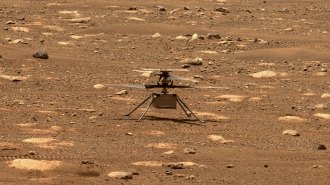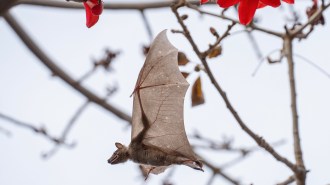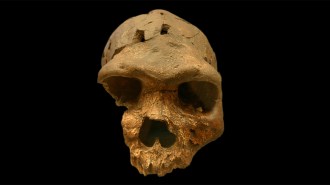Uncategorized
-
 Planetary Science
Planetary ScienceHere’s how NASA’s Ingenuity helicopter has spent 1 year on Mars
The first flying robot on the Red Planet arrived as a technology demonstration. It’s now a trusty scout for its rover partner, Perseverance.
By Liz Kruesi -
 Particle Physics
Particle PhysicsA new nuclear imaging prototype detects tumors’ faint glow
Nuclear imaging that relies on Cerenkov light could supplement standard-of-care technology for identifying location of tumors.
By Anna Gibbs -
 Astronomy
AstronomyCrumbling planets might trigger repeating fast radio bursts
Mysterious blasts of cosmic radio waves might be due to planets sweeping extremely close to their host neutron stars.
By Liz Kruesi -

-

To solve mysteries, scientists look to muons
Editor in chief Nancy Shute discusses how researchers are using subatomic particles called muons as tools for scientific discovery
By Nancy Shute -
 Animals
AnimalsMost bats don’t echolocate in broad daylight. Here’s an exception
Egyptian fruit bats in Tel Aviv regularly navigate by sound during midday hours to avoid obstacles and forage, despite their excellent vision.
-
 Climate
ClimateCoastal cities around the globe are sinking
Of 99 coastal cities, nearly one-third are sinking in some places at more than a centimeter per year, making them more vulnerable to rising seas.
-
 Astronomy
AstronomyA newly discovered planet renews debate about how some giant worlds form
An implosion of gas may have given birth to this young exoplanet, which orbits too far from its star to have been built up bit by bit, researchers say.
-
 Archaeology
ArchaeologyThis hieroglyph is the oldest known record of the Maya calendar
Plaster fragments with the markings date to at least 200 B.C. and indicate that the calendar system, still used today, might be centuries older.
By Anna Gibbs -
 Planetary Science
Planetary ScienceThis is the biggest known comet in our solar system
The nucleus of comet Bernardinelli-Bernstein is about 120 kilometers across — about twice the width of Rhode Island — and is darker than coal.
By Sid Perkins -
 Anthropology
AnthropologyHow ancient, recurring climate changes may have shaped human evolution
Climate changes drove where Homo species lived over the last 2 million years, with a disputed ancestor giving rise to H. sapiens, a new study claims.
By Bruce Bower -
 Agriculture
AgricultureMore than 57 billion tons of soil have eroded in the U.S. Midwest
Researchers discovered startling soil erosion rates in the Midwest. Farming has worsened erosion, but no-till practices and cover crops can help.